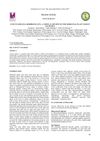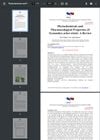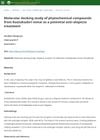 7 citations,
January 2019 in “Brazilian Journal of Pharmaceutical Sciences”
7 citations,
January 2019 in “Brazilian Journal of Pharmaceutical Sciences” Maidenhair fern extract reduced anxiety and depression in rats and may work due to its antioxidant and anti-inflammatory properties.
 August 2023 in “Skin Research and Technology”
August 2023 in “Skin Research and Technology” BLH308, with persimmon leaf, green tea, and sophora fruit extracts, safely increased hair density and thickness.
 December 2023 in “Bulletin of the Medical Institute of Continuing Education”
December 2023 in “Bulletin of the Medical Institute of Continuing Education” Angelica Dahurica extract helps reduce hair loss and improve hair growth and scalp condition.
May 2024 in “Jurnal Penelitian Farmasi dan Herbal” Meniran leaf extract pomade with 10% concentration effectively stimulates hair growth in rabbits.
 4 citations,
January 2008 in “Food Science and Technology Research”
4 citations,
January 2008 in “Food Science and Technology Research” Mature leaves of 'Saijo' persimmon have the most vitamin C and both mature leaves and new shoots are rich in polyphenols.
 32 citations,
January 2021 in “Molecules”
32 citations,
January 2021 in “Molecules” Some Middle Eastern plants may help treat diabetes and could be alternatives to current drugs, but more research is needed.
 4 citations,
December 2017 in “International journal of research in ayurveda and pharmacy”
4 citations,
December 2017 in “International journal of research in ayurveda and pharmacy” The dodder plant has anti-inflammatory, antimicrobial properties, and may promote hair growth.
 July 2024 in “International Journal of Pharmaceutical Sciences and Medicine”
July 2024 in “International Journal of Pharmaceutical Sciences and Medicine” Nyctanthes arbor-tristis is effective for treating many health issues.
 30 citations,
January 2000 in “Dermatologic Clinics”
30 citations,
January 2000 in “Dermatologic Clinics” Finasteride and minoxidil are effective FDA-approved treatments for androgenetic alopecia.
 22 citations,
March 2000 in “Clinics in Dermatology”
22 citations,
March 2000 in “Clinics in Dermatology” Many treatments for hair loss lack proper testing and FDA approval, so their effectiveness is uncertain.
 19 citations,
October 2018 in “Medicine”
19 citations,
October 2018 in “Medicine” Oriental herbal medicine with moxibustion may improve pregnancy rates and other symptoms in PCOS, but more high-quality research is needed.
 7 citations,
October 2019 in “Evidence-based Complementary and Alternative Medicine”
7 citations,
October 2019 in “Evidence-based Complementary and Alternative Medicine” Chinese medicine may help hair growth and reduce hair loss in androgenetic alopecia.
 May 2023 in “Journal of Pharmaceutical Research”
May 2023 in “Journal of Pharmaceutical Research” Neem is highly beneficial for health and beauty with no major side effects.
 January 2020 in “Elsevier eBooks”
January 2020 in “Elsevier eBooks” Plant-based chemicals may help hair growth and prevent hair loss but need more research to compete with current treatments.
 9 citations,
December 2022 in “Phytomedicine”
9 citations,
December 2022 in “Phytomedicine” More high-quality research is needed to recommend flavonoids and saponins for clinical use.
13 citations,
August 2018 in “Life sciences” Kang-ai injection with platinum-based chemotherapy improves tumor response and immune function while reducing side effects in advanced lung cancer.
 March 2024 in “International journal of pharmaceutical and bio-medical science (Print)”
March 2024 in “International journal of pharmaceutical and bio-medical science (Print)” Angelica Sinensis and Chinese Arborvitae have various medicinal benefits, including anti-inflammatory and anti-cancer effects.
 37 citations,
January 1997 in “Clinics in Dermatology”
37 citations,
January 1997 in “Clinics in Dermatology” Hair problems are common and distressing for women, but increasing knowledge of treatments offers hope.
 August 2024 in “Journal of Contemporary Medical Practice”
August 2024 in “Journal of Contemporary Medical Practice” Professor Ma Shuanquan treats hair loss by using Chinese medicine to improve liver, spleen, and kidney health.
 August 2022 in “Journal of Contemporary medical practice”
August 2022 in “Journal of Contemporary medical practice” Combining Traditional Chinese Medicine and Western medicine can improve symptoms, hormone levels, and pregnancy outcomes in Polycystic Ovary Syndrome patients, but more research is needed.
 35 citations,
September 2017 in “PubMed”
35 citations,
September 2017 in “PubMed” The document concludes that hair loss has many causes and treatments vary, including medication for pattern baldness and addressing underlying issues for other types.
 September 2023 in “Food and chemical toxicology”
September 2023 in “Food and chemical toxicology” High doses of some selenium supplements caused liver and reproductive harm in rats.
 4 citations,
May 2020 in “Annals of palliative medicine”
4 citations,
May 2020 in “Annals of palliative medicine” Plum blossom needle acupuncture with qi-invigorating therapy is more effective for Seborrheic Alopecia than Western medicine.
 July 2024 in “International Journal of Ayurvedic Medicine”
July 2024 in “International Journal of Ayurvedic Medicine” Certain compounds from Kushtakudori ennai may help treat hair loss.
 1 citations,
February 2018 in “Orthopedics and rheumatology”
1 citations,
February 2018 in “Orthopedics and rheumatology” Combining Western chemotherapy with Traditional Chinese Medicine can reduce side effects and improve immune response in treating bone and soft tissue tumors.
January 2021 in “Annals of translational medicine” YH0618 helped reduce skin and nail problems and fatigue in chemotherapy patients.























